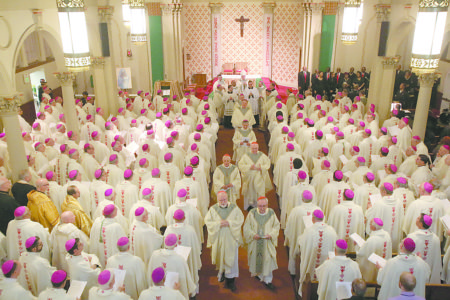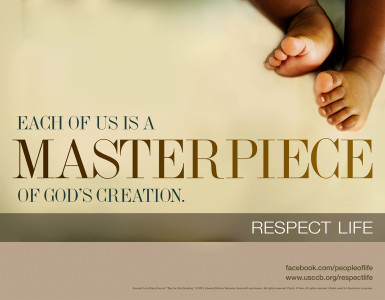(Editor’s note: Bishop Joseph Kopacz attended the U.S. Conference of Catholic Bishops’ (USCCB) fall assembly. He was not able to write a column this week because of travel so news from the assembly takes the place of his column this week.)
BALTIMORE (CNS) – A groundbreaking new study commissioned by the bishops that finds diversity abounds in the U.S. Catholic Church is a clarion call to Catholic institutions and ministries to adapt and prepare for growing diversity, said Archbishop Gustavo Garcia-Siller of San Antonio.
On Nov. 15, the second day of the bishops’ annual fall assembly in Baltimore, the archbishop shared results of a report by the Center for Applied Research in the Apostolate at Georgetown University showing the church is one of the most culturally diverse institutions in the United States.

Bishops and alter servers process out after Mass at St. Peter Claver Church in Baltimore Nov. 14 during the annual fall general assembly of the U.S. Conference of Catholic Bishops. (CNS photo/Bob Roller) See BISHOPS-PETER-CLAVER-MASS Nov. 15, 2016.
It was commissioned by the U.S. Conference of Catholic Bishops’ Committee on Cultural Diversity in the Church, chaired by Archbishop Garcia-Siller, to help identify the size and distribution of ethnic communities in the country — Hispanic and Latino, African-American, Asian-American and Native American.
He asked his brother bishops to look at the data and see how it speaks to their regions to help dioceses plan, set priorities and allocate resources.
The study’s finding that there are close to 30 million Hispanics in the U.S. church resonated in the election earlier that day of Archbishop Jose Gómez of Los Angeles to a three-year term as USCCB vice president, bringing a Latino voice to the leadership role for the first time.
Cardinal Daniel DiNardo of Galveston-Houston was elected to a three-year term as USCCB president, succeeding Archbishop Joseph Kurtz of Louisville, Kentucky, whose term ended with the close of the meeting.
The bishops also heard about the church’s preparations for the fifth National Encuentro of Hispanic/Latino Ministry, from Auxiliary Bishop Nelson Perez of Rockville Centre, New York, chairman of the bishops’ Subcommittee on Hispanic Affairs.
The V Encuentro, as it is being called, is to be held in September 2018 in Fort Worth, Texas. It will be the culmination of parish, diocesan and regional encuentros, in which the bishops anticipate more than one million Catholics participating over the next two years.
“It is a great opportunity for the church to reach out to our Hispanic brothers and sisters with Christ’s message of hope and love,” Bishop Perez said. “It is a time to listen, a time to develop meaningful relationships, a time to learn and bear abundant fruits, and a time to rejoice in God’s love.”
The effort got a personal endorsement from Pope Francis during a Nov. 15 video message to the U.S. bishops at their fall general assembly in Baltimore.
In other action Nov. 15, the bishops approved making permanent their Subcommittee on the Church in Africa and the hiring of two people to assist the subcommittee in carrying out its work. They also approved another 10-year extension for the Retirement Fund for Religious national collection; before the vote, the collection had been authorized through 2017.
They approved a strategic plan that will govern the work of the conference and its committees from 2017 through 2020, incorporating the theme “Encountering the Mercy of Christ and Accompanying His People With Joy.” It sets five priorities: evangelization, marriage and family life, human life and dignity, vocations, and religious freedom.
Maronite Bishop Gregory Mansour gave a presentation on the persecution of Christians in the Middle East, urging the U.S. bishops to bring wider attention to the situation to their parishes and political leaders.
A theme of outreach and inclusion ran through many sessions of the two days of public sessions of the bishops’ meeting. Sessions on the last day of the assembly, Nov. 16, were held in executive session, except for a brief address by Cardinal Marc Ouellet, prefect of the Vatican Congregation for Bishops, that was live-streamed. Echoing Pope Francis, he told the U.S. bishops that their ministry is to be “witnesses to the Risen One.”
As the meeting opened Nov. 14, the bishops affirmed as a body a Nov. 11 letter from Auxiliary Bishop Eusebio Elizondo of Seattle, as outgoing chairman of the Committee on Migration, calling on President-elect Donald Trump “to continue to protect the inherent dignity of refugees and migrants.”
The bishops’ group action followed by a day a TV interview in which Trump said one of his first actions would be to deport two million to three million people he described as “criminal and have criminal records” and entered the country without government permission.
In the letter, Bishop Elizondo offered “a special word to migrant and refugee families living in the United States: Be assured of our solidarity and continued accompaniment as you work for a better life.”
That first day the bishops heard a plea from Archbishop Christophe Pierre, the new nuncio to the United States, that the U.S. bishops and the U.S. church as a whole reach out to young Catholics, meeting them where they are and engaging them in their faith.
In his last presidential address, Archbishop Kurtz discussed the need to move beyond the acrimony of the now-completed presidential elections, but the main focus of his speech were the encounters he had in his three-year term in which he found that small and often intimate gestures provide big lessons for bishops to learn as they exercise their ministry.
The people he encountered in all his travels were concerned about something beyond themselves — the common good, he said Nov. 14. Seeking the common good would serve the nation well as it moves forward from the “unprecedented lack of civility and even rancor” of the national elections, Archbishop Kurtz said.
In other business the first day, the bishops heard a report on the 2017 Convocation of Catholic Leaders to be held in Orlando, Florida, next July to exploring the Gospel in American life. More than 3,000 people reflecting the diversity of the church are expected to participate. Cardinal Timothy M. Dolan of New York, who gave an update on the planning, urged bishops in each diocese to send a delegation to the event.
Cardinal Dolan also shared details of a simple celebration next year to mark the 100th anniversary of the U.S. Conference of Catholic Bishops, founded originally as the National Catholic War Council.
Events will take place Nov. 12 as the bishops convene for their 2017 fall assembly. Cardinal Pietro Parolin, Vatican secretary of state, will be principal celebrant of an anniversary Mass at Baltimore’s Basilica of the National Shrine of the Assumption of the Blessed Virgin Mary; Cardinal Ouellet will deliver the homily.
In his report as chairman of the bishops’ Ad Hoc Committee for Religious Liberty, Archbishop William E. Lori of Baltimore said all U.S. bishops are required to speak out for religious freedom for all people of faith whose beliefs are compromised.
Bishops must equip laypeople to speak in the public arena about the necessity to protect religious liberty when interventions by government officials at any level infringe on the free practice of religion, he stressed.
In a final afternoon session and later at a news conference that concluded the first meeting day, Archbishop Wilton D. Gregory of Atlanta returned to the tensions of the election year.
He is chairman of the new Task Force to Promote Peace in Our Communities, created in July by Archbishop Kurtz in response to the wave of violence in a number of communities following shootings by and of police. Archbishop Gregory urged the bishops to issue, sooner rather than later, a document on racism, given “postelection uncertainty” and that some of the tensions have only gotten worse following the presidential election.
Most questions during news conference that followed focused on the postelection climate. Archbishop Gregory stressed that the church should play a role in helping restore peace in the current climate that is so inflamed.
He also pointed out that no political parties fully embrace all life issues, something that had been stressed by Chicago Cardinal Joseph Bernardin, who died 20 years to the day of Archbishop Gregory’s remarks.
On the issue of healing racial divides, he said the Catholic response should start at the parish level. “Words are cheap, actions stronger,” he added.
Archbishop Gomez spoke of the fear many immigrants have of possible deportation since Trump’s election as president. When asked if churches could possibly provide sanctuaries for this group, he said that was impossible to answer at this point.
The day ended with the bishops celebrating their annual fall assembly Mass at a West Baltimore church known as the “mother church” of black Catholics, rather than in their traditional venue of Baltimore’s historic basilica.
In his homily, Archbishop Kurtz said the bishops came to the church “to be present, to see with our own eyes, so that we might humbly take a step and lead others to do so.”
(Contributing to this story were Mark Pattison, Rhina Guidos, Carol Zimmermann and Dennis Sadowski).

 By Maureen Smith
By Maureen Smith